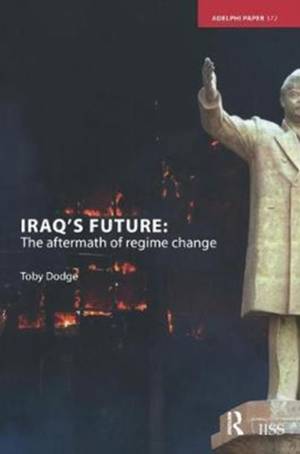
Door een staking bij bpost kan je online bestelling op dit moment iets langer onderweg zijn dan voorzien. Dringend iets nodig? Onze winkels ontvangen jou met open armen!
- Afhalen na 1 uur in een winkel met voorraad
- Gratis thuislevering in België vanaf € 30
- Ruim aanbod met 7 miljoen producten
Door een staking bij bpost kan je online bestelling op dit moment iets langer onderweg zijn dan voorzien. Dringend iets nodig? Onze winkels ontvangen jou met open armen!
- Afhalen na 1 uur in een winkel met voorraad
- Gratis thuislevering in België vanaf € 30
- Ruim aanbod met 7 miljoen producten
Zoeken
€ 216,45
+ 432 punten
Uitvoering
Omschrijving
It is hard to over estimate what is at stake in Iraq today. The removal of Saddam Hussein's regime in April 2003 has proved to be the beginning, not the culmination, of a long and very uncertain process of state-building. This Adelphi Paper examines this process from a military, political and sociological perspective. Possible futures for Iraq are charted, first by studying the evolution of the criminal and politically-motivated violence that has come to dominate the everyday lives of ordinary Iraqis. The paper then details the strengths and weaknesses of the political structures built after the fall of Saddam's regime, from the formation of the Iraqi Governing Council in 2004 to the elections of January 2005, and traces the forces driving political mobilization in post-Saddam Iraq. It concludes by analyzing the ramifications of regime change for US policy and the wider Middle East.
Specificaties
Betrokkenen
- Auteur(s):
- Uitgeverij:
Inhoud
- Aantal bladzijden:
- 72
- Taal:
- Engels
- Reeks:
Eigenschappen
- Productcode (EAN):
- 9781138452084
- Verschijningsdatum:
- 30/06/2017
- Uitvoering:
- Hardcover
- Formaat:
- Genaaid
- Afmetingen:
- 156 mm x 233 mm
- Gewicht:
- 452 g

Alleen bij Standaard Boekhandel
+ 432 punten op je klantenkaart van Standaard Boekhandel
Beoordelingen
We publiceren alleen reviews die voldoen aan de voorwaarden voor reviews. Bekijk onze voorwaarden voor reviews.











